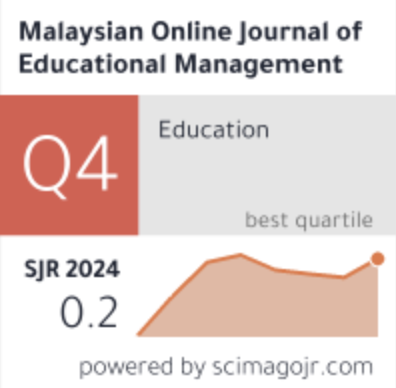CHANGE ORIENTATION AND ORGANIZATIONAL CLIMATE: EXPERIENCE FROM MALAYSIAN PRIMARY SCHOOLS
DOI:
https://doi.org/10.22452/mojem.vol6no2.5Abstract
The aim of this study is to find the relationships that exist between change orientation and school organizational climate. This study also seeks to find the level of practice for the aspects in change orientation and school climate. The research samples for this quantitative research were taken from 246 teachers from national primary schools in Kuala Lumpur, Malaysia. The data were collected using the combination of two questionnaires namely Faculty Change Orientation Scale (FCOS) and the Organizational Climate Description Questionnaire for Elementary Schools (OCDQ-RE). The data were then analysed using descriptive and inferential statistics to test the research hypotheses. Findings indicate that the practice level of all three dimensions (faculty openness to change, principal openness to change and community press for change) in change orientation are high. Meanwhile, the practice level of five dimensions (supportive principal behaviour, directive principal behaviour, restrictive principal behaviour, collegial teacher behaviour and intimate teacher behaviour) in school climate are moderate and the other one dimension, (disengaged teacher behaviour) is low. In addition, the Multiple Linear Regression analysis showed one of the dimensions in change orientation (community press for change) has a significant relationship with school climate. Implication of the study shows that pressure for change from community outside school have direct impact on school climate. However, the aspect of support from school heads and intimate relationship among teachers need to be improvised as these are important dimensions that contribute to positive school climate. Some recommendations from this study are; to establish and maintain positive community relations, increase of school heads’ support for teachers and to have strategic management approach in dealing with educational changes in schools









